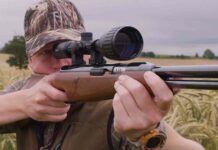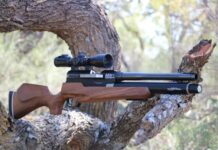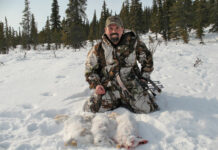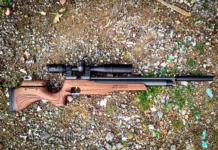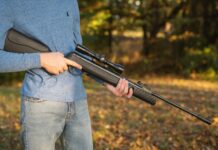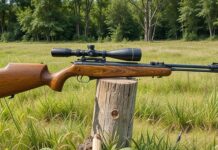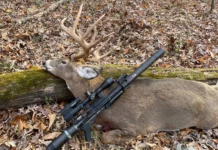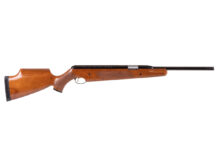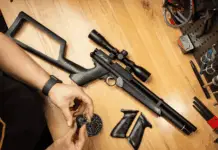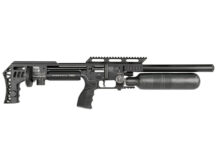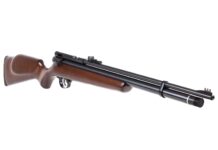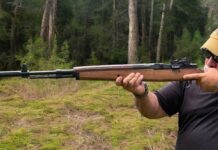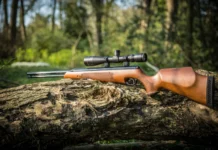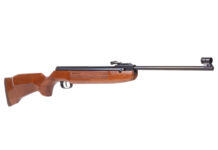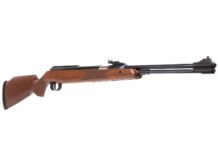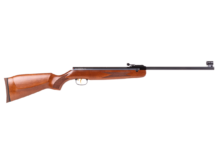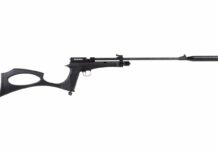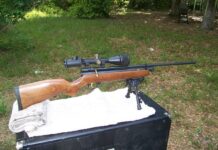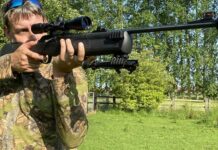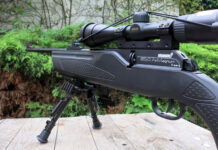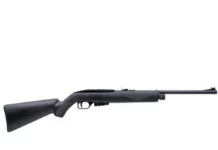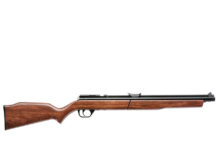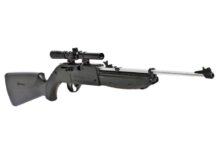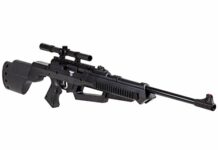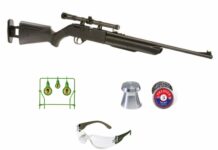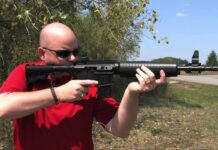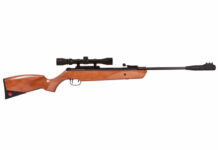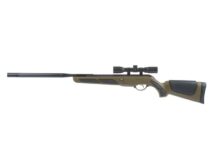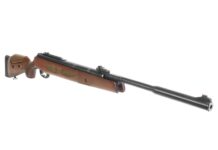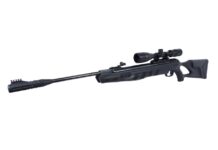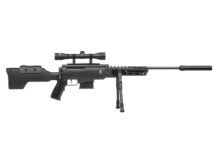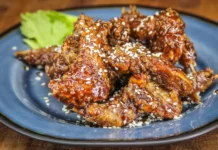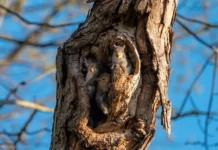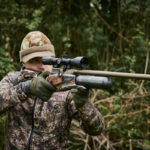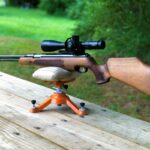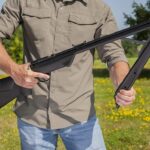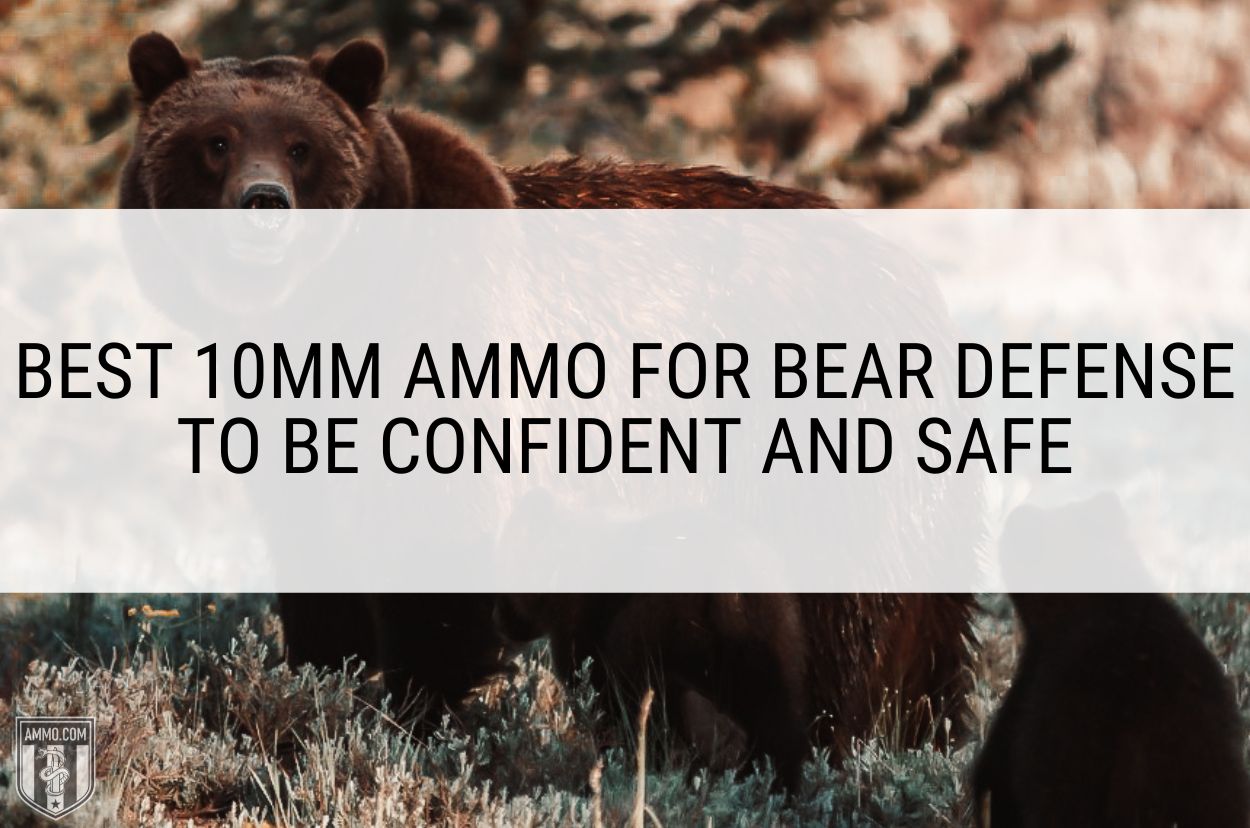
Whether hunting, hiking, or just living in bear country, the threat of a hostile encounter with the largest predator walking the Earth can cause some well-deserved worry.
Fortunately, 10mm Auto is here to help ease those worries and make traveling in bear country a little less stressful.
We will go over all of the best 10mm ammo options for bear defense, break down what we like about them, and explain why we think they’re the best options for keeping yourself safe if you find yourself in a dicey situation with a bear.
But if you’re just here for a quick answer and aren’t interested in all the fine details, our top overall pick is Underwood Ammo 200gr Hard Cast ammo. It’s a tremendous general-purpose option that works well in most of the top 10mm handguns and is perfect for dealing with dangerous game like bear.
If you want a little more info, or at least some other options that you can try (always test any personal defense ammo in your gun before carrying it), then read on for in-depth breakdowns of each of our top picks.
We’ll also go over everything you need to know about choosing the right round for your specific needs and some general info about how to use 10mm ammo for bear defense effectively.
Table of Contents
- 1 Top 10mm Loads For Bear Defense
- 2 Best 10mm Ammo For Bear Protection
- 3 Honorable Mentions
- 4 Parting Shots: Loaded for Bear
- 5 Buyer’s Guide: Choosing the Best Bear Defense Ammo for Your Needs
- 5.1 Quick Background on 10mm Auto
- 5.2 Why 10mm for Bear Defense?
- 5.3 Bullet Types Explained (FMJ, SCHP, Hard-Cast, Monolithic Solids, Etc)
- 5.4 Expansion vs. Penetration
- 5.5 Bullet Weight: Is Bigger Better for Bear?
- 5.6 Speed Kills: High-Velocity Ammo for High-Velocity Threats
- 5.7 Bulk 10mm Ammo for Training
- 5.8 Don’t Dismiss the Bear Spray
- 6 Final Thoughts & More 10mm Resources
Top 10mm Loads For Bear Defense
- Underwood 10mm Ammo 200 Grain Hard Cast – Best Overall
- Sellier & Bellot 180gr FMJ – Best Budget
- Barnes VOR-TX 155gr XPB – Best Hollowpoint
- Blazer Brass 180gr FMJ – Best Bulk
Best 10mm Ammo For Bear Protection
Underwood 10mm Ammo 200 Grain Hard Cast – Best Overall
Specs
- Bullet type: 200gr Hard-Cast
- Primer Type: Boxer
- Casing Type: Nickel-Plated Brass
- Muzzle Velocity:1250 FPS
- Muzzle Energy: 694 ft-lbs
Pros
- Feeds reliably
- Hi-Tek Polymer-coated hard-cast bullet reduces lead fouling
- The nickel-plated casing is reloadable and slicker/more corrosion-resistant than brass casings
Cons
- Expensive
- Not available in bulk
Why We Chose It
This 200gr hard-cast 10mm load by Underwood is designed specifically for dealing with large, dangerous game animals, and it’s just about perfect for dealing with bears.
The hard-cast bullet is coated with Underwood’s Hi-Tek polymer coating that helps cut down on lead fouling, helps the flat-nosed round feed more reliably in semi-autos, and has a Brinell Hardness of 21. This means it is about five times harder than a pure lead projectile, which aids penetration.
During testing, this ammo fed in a few temperamental 10mm 1911s that didn’t want to shoot any other ammo we had available. The lower coefficient of friction from the nickel-plated casing (more on that in a minute), plus the slickness of the polymer coating, makes this an excellent option for guns that struggle with traditional lead wadcutters.
Underwood also uses a low-flash powder designed to help preserve your night vision in low-light situations, when you’re more likely to accidentally walk up onto a bear or run into one out and about at dawn or dusk.
Lastly, the casing is nickel-plated, which means it is slicker than brass and thus feeds more reliably than standard casings. It’s also more corrosion-resistant yet still reloadable, which is great because 10mm is a fantastic candidate for reloading.
Sellier & Bellot 180 Grain FMJ
Specs
- Bullet type: 180gr FMJ
- Primer Type: Boxer
- Casing Type: Brass
- Muzzle Velocity:1165 FPS
- Muzzle Energy: 544 ft-lbs
Pros
- High-quality, new-production brass casing
- Available in 50, 250, and 1000-round counts
- Manufactured to high standards in an IS0 9001 facility
Cons
- Less penetration than hard-cast bullets
For our more budget-minded shooters who still want to be safe in bear country, Sellier & Bellot 180gr FMJ is a great option. Sellier & Bellot is one of the older ammo manufacturers out there, and they bring nearly two-hundred years of experience to everything they make.
I’ve tested this ammo extensively, and my Glock 20 has had coming up on a thousand rounds of this exact ammo through the barrel, and I’ve never once had so much as a hiccup with it.
Part of that is that Glocks tend to go bang every time you ask them to, but the ammo plays just as much a role in that reliability.
Barnes VOR-TX 155gr XPB 10mm Auto – Best Solid-Copper Hollowpoint
Specs
- Bullet type: 155gr FMJ
- Primer Type: Boxer
- Casing Type: Brass
- Muzzle Velocity: 1150 FPS
- Muzzle Energy: 455 ft-lbs
Pros
- Solid-Copper Projectile
- Suitable for front-country areas where you may also need to defend yourself from other humans
- Penetrates 25% deeper than lead-core hollowpoints
- A great option for black bear
- Solid hunting round for deer, antelope, and hogs
Cons
- Less penetration than FMJ or hard-cast rounds
- Lightweight projectile
- It might be insufficient against larger bear species.
Next, we have our only hollow-point offering, the Barnes VOR-TX 155gr XPB. This solid-copper hollowpoint is designed for hunting and is geared towards medium game in the 50-300lb range, like deer, antelope, sheep, and wild hogs.
The solid copper projectile expands slower than a copper-jacketed lead projectile, so you get around 25% more penetration than you would with a typical self-defense round geared toward stopping a human attacker.
It may not provide enough penetration to stop a brown or polar bear immediately, but I’d feel confident carrying it in black bear country (and have done so).
It’s also a decent personal-defense option for established trails and other high-traffic areas where a two-legged attacker might be the more likely threat.
It does provide a more effective wound channel than the non-expanding projectiles, but a thick shoulder bone or skull may stop it. Use caution when dealing with larger bear species; if you need to send one, be prepared to send several.
Blazer Brass 180gr FMJ – Best Bulk
Specs
- Bullet type: 180gr FMJ
- Primer Type: Boxer
- Casing Type: Brass
- Muzzle Velocity: 1200 FPS
- Muzzle Energy: 575 ft-lbs
Pros
- Affordable
- Available in Bulk
- Consistent velocity
Cons
- Designed for Target Shooting
- Low-quality brass casings (only a problem for reloaders)
Why We Chose It
For something more affordable that will still get the job done, Blazer Brass 180gr FMJ is a great option. This is primarily a target bullet, but for our purposes, the FMJ projectile is what we’re really interested in.
Blazer is one of the most reliable budget ammo manufacturers, so this is a great option if you’re looking for something you can train extensively with, without needing to take out a second mortgage to pick up a case.
For dealing with a bear, target ammo or not, it’s still a 180-grain full-metal jacket projectile moving at 1200fps no matter what the manufacturer says it’s for. 575 ft-lbs is enough energy to deal with a serious threat, all the way up to the largest bear species out there.
If you’re going to run a slightly more premium option for carry, this is still a top-tier training round and an excellent choice to make sure you get in enough practice to be proficient if things go downhill and you do have to actually use your 10mm to stop a bear.
Honorable Mentions
Some honorable mentions that we either haven’t tested enough but are still very confident in or ones we’re just waiting for manufacturers to release more stock are:
Buffalo Bore 220-Grain Hard-Cast
Buffalo Bore is known for its hard-hitting, full-power rounds that get the job done on even the largest game animals, and their 10mm offering tips the scales at 220 grains of bear-stopping power.
It’s hard to find this stuff in stock, and the recoil is killer, but if you’re looking for the heaviest factory-loaded 10mm ammo on the market, I’m pretty sure this is it. If you want bigger or faster, you will need to either look into reloading or switch to .50 AE.
Underwood 140gr Xtreme Penetrator Solid Monolithic
These rounds are topped with Lehigh Defense Xtreme Penetrator monolithic projectiles designed for maximum stopping power and penetration. The X-shaped tip helps to increase wound cavitation while maintaining deep penetration.
These bullets are also very popular for reloading and a great option if you decide to roll your own 10mm ammo for bear protection.
Winchester White Box 180gr FMJ
Good ole Winchester White Box is some of the most readily available on the planet, and of course, there’s a 10mm flavor out there. This great training ammo can also do double duty as a budget bear defense round.
Parting Shots: Loaded for Bear
That’s all we’ve got for our 10mm ammo picks for bear defense. These are the rounds that have the best balance of penetration, velocity, cost, and reliability in the most common 10mm handguns.
You should now be armed (pun intended) with enough info to choose a 10mm round that will get the job done if you’re ever faced with a bear that wants to harm you.
Still, if you want more info, you can check out the buying guide below, which will walk you through some more specific considerations for choosing the best option for your particular needs.
You can also check out our entire catalog of 10mm ammo, and our selection of bulk ammo, including some good deals on 1000-round cases of 10mm goodness.
Buyer’s Guide: Choosing the Best Bear Defense Ammo for Your Needs
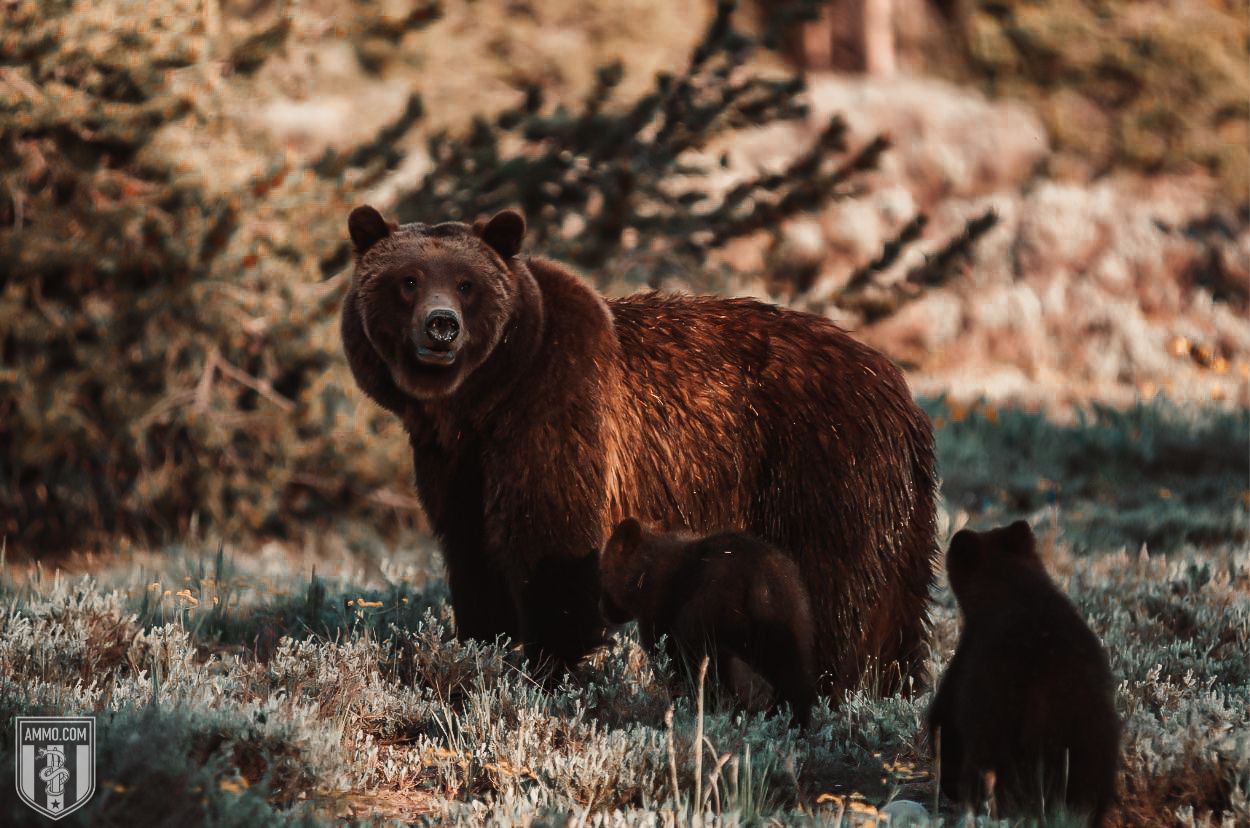
We will review a few considerations for choosing 10mm ammo for dealing with bears, including some essential background, why people choose 10mm over other rounds for bear defense, and some specific ballistics to keep in mind when making your selection.
All of the following info can help you choose from our five top picks here, and it’ll also help if you decide to order off-menu and go with a round we haven’t featured.
Lastly, remember that the best ammo to have is the ammo you can use to hit your target and that you can count on to work in your gun. Whatever ammo you use, buy enough to train with it and ensure your gun will run it reliably.
Quick Background on 10mm Auto
10mm Automatic was created by what is now Norma Precision, has been around since the early 1980s, and rose to prominence after the FBI selected it as a service cartridge following the 1986 FBI Miami shootout.
During this deadly shootout, a suspect was struck multiple times by FBI agents firing .357 magnum, 9mm, and .38 special rounds from their service weapons, yet still managed to return fire, killing two FBI Special Agents and wounding five more.
This incident and the subsequent media coverage and analysis drove the adoption of harder-hitting handgun cartridges among many local and federal law enforcement agencies.
While the FBI soon replaced the 10mm with a shorter derivative that we know today as .40 S&W, it would become a popular cartridge among an enthusiastic core of civilian shooters and remains a beloved, if niche, high-power handgun round.
The first handgun chambered in 10mm was the Bren Ten. Still, after the company folded, other companies such as Colt, Glock, Sig Sauer, Remington, Smith & Wesson, and Springfield Armory released their own 10mm handguns, and the rest is history.
Why 10mm for Bear Defense?
10mm has become one of the de facto options for bear defense because of its proven performance and the capacity advantages it brings to the table compared to high-power revolver cartridges.
In a high-stress situation (and I can think of few higher-stress situations than a bear attack), having 16 rounds in a semi-automatic handgun like a Glock 20 or Springfield XD-M dramatically increases your chances of stopping the threat.
Also, 10mm is right on the borderline, where it fits well into a semi-auto without making the gun monstrously large or heavy, but it still has enough power to stop an 800lb hostile Grizzly bear if you put the rounds where they need to go.
It has more power than the .45 ACP, and it’s also easier to shoot quickly than the bigger revolver cartridges like .44 Magnum, .454 Casull, .480 Ruger, and others typically recommended for bear defense.
These rounds are grand, but try a quick double-tap with them, and you’ll probably see that rapid fire is less than viable in a high-stress situation.
For many people, myself included, this makes 10mm the Goldilocks round (get it?) for dealing with bears. It’s big and powerful enough to do the job but not so big and powerful that it’s overly difficult to shoot or relegated to only being fired from a revolver or low-capacity semi-auto.
Bullet Types Explained (FMJ, SCHP, Hard-Cast, Monolithic Solids, Etc)
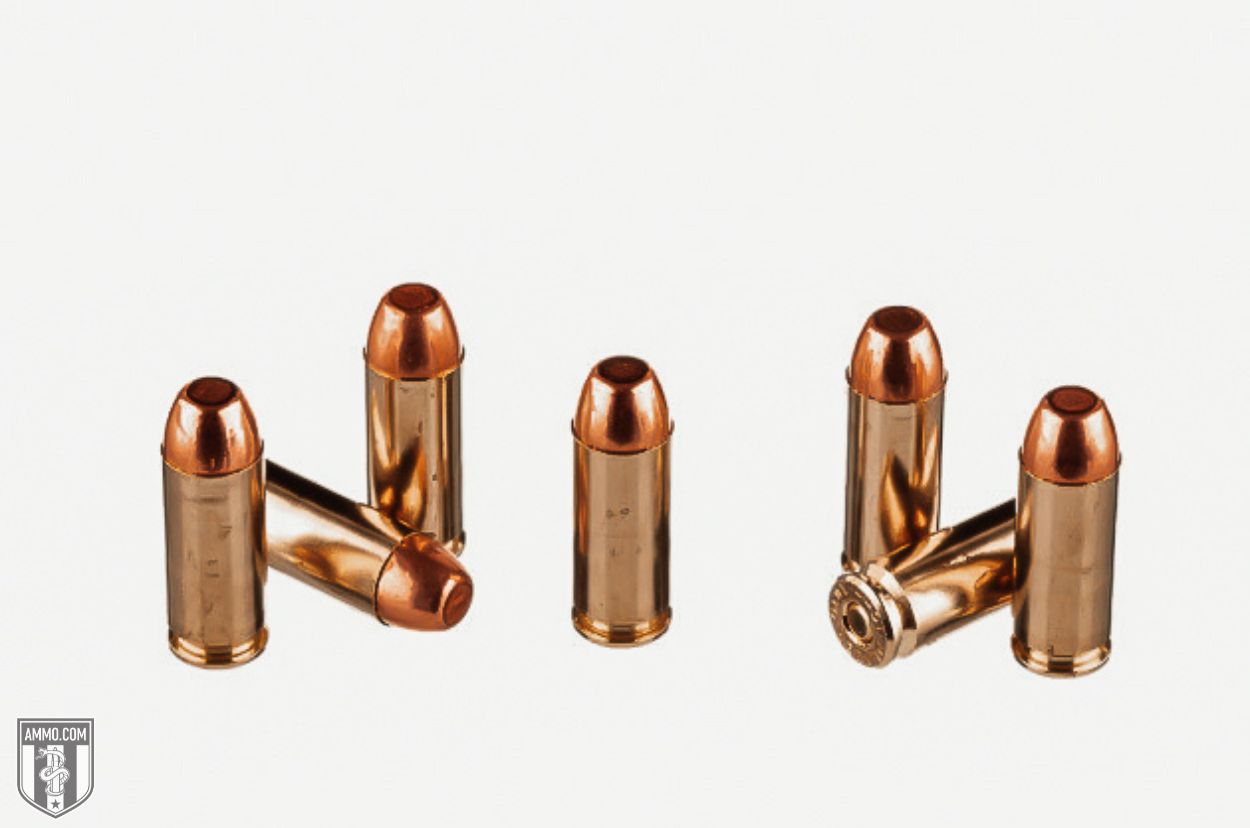
There are many bullet types out there, but when choosing a handgun bullet to dispatch a bear, the accepted wisdom is that you want something with a reasonably flat tip designed more for penetration than expansion.
If you’re defending yourself from a bear, not hunting one, chances are you’re shooting at a bear that’s facing you, which means for a bullet to get to something vital, it needs to go through an eye (you’re not a good enough shot to pull that off reliably and neither is anyone else) or it needs to go through the skull or sternum.
Those are thick bones, and a brown bear skull is excellent at deflecting round-nose or soft-point bullets moving at handgun velocities. To deal with a bear effectively, I strongly suggest sticking to the following bullet types:
Full Metal Jacket (FMJ): You know this one —a simple lead projectile with a copper jacket around it for strength. Go for the flat-nose varieties.
Solid-Copper Hollow Point (SCHP): The only type of hollow-point you might want to carry for bear defense, these solid-copper projectiles hold their shape and expand less than other hollow-point types with a softer lead core.
Hard-Cast: Hard-cast loads are available in various shapes, but the most common options for bear defense are wadcutter (WC) and semi-wadcutter (SWC). Hard cast ammo differs from a standard lead projectile like lead round nose (LRN) or simple lead wadcutters.
With hard-cast ammo, the lead is alloyed with another metal (usually antimony) to make it harder and more resistant to deformation. This allows it to penetrate further and through tougher materials like bone.
Monolithic or Monolithic Solid: These are, as the name implies, solid metal projectiles that are typically turned on a CNC lathe. They are usually made of copper and might have a flat or X-shaped tip to aid penetration and wound-channel creation. These are expensive but effective.
Other Bullet Types: There are, of course, dozens of other commercial bullet types and profiles out there, but for bear defense with any handgun, you want to stay away from typical self-defense/home-defense and hunting loads like jacketed hollowpoint (JHP) and soft-point rounds.
These rounds are designed to mushroom open to create a wider wound channel, which is excellent for a human threat or medium-sized game like deer and hogs, but for large/dangerous game, they may not penetrate enough to stop the threat in time.
The most dangerous bear species are brown and polar bears, which are giant animals. Creating a large wound channel that doesn’t intersect with a vital organ will very likely not be enough to stop a determined bear before it reaches you.
Expansion vs. Penetration
With all these bullet types, the deciding factor comes down to a balance of expansion and penetration, and which is most likely to stop the bear quickly and efficiently.
In general, more penetration is better.
We’re trying to put a round into the brain or deep into the chest cavity, and in both cases, there’s a big chunk of bone in the way before the bullet gets where it needs to go. This makes FMJ, monolithic, and hard-cast bullets the preferred options.
That’s not to say that something like a Hornady XTP/Critical Duty or Speer Gold Dot hollowpoint won’t work, especially in something like a 10mm where you have a high capacity.
Still, you’re generally better off going with rounds designed to stay together and penetrate deep, more so than ones created to open up and expand.
Most expanding bullets on the market, particularly handgun bullets, are designed to expend all of their energy within 18” or so of striking the target and not travel much deeper. That 18” depth of penetration is based on FBI recommendations, and is something of an industry standard now.
Versus a human threat or medium game, this means that the round will expend all its energy on the target and not waste any on exit. For defending yourself from a human attacker, also means the round is less likely to over-penetrate and harm an innocent bystander.
Versus an 800lb bear with dense muscle, inches of fat, and thick bone protecting its vitals, 18” of penetration will be woefully inadequate. This is why harder, non-expanding bullets are preferred for larger, dangerous animals.
And it doesn’t get much larger or more dangerous than a brown or polar bear, the latter of which can weigh five to six times what the average human male does, and is essentially the only animal on Earth that will indiscriminately pursue a human as prey.
In other words, 18” of penetration from a bullet designed to protect you from a 200lb human threat isn’t going to work on any of the larger bear species.
Bullet Weight: Is Bigger Better for Bear?
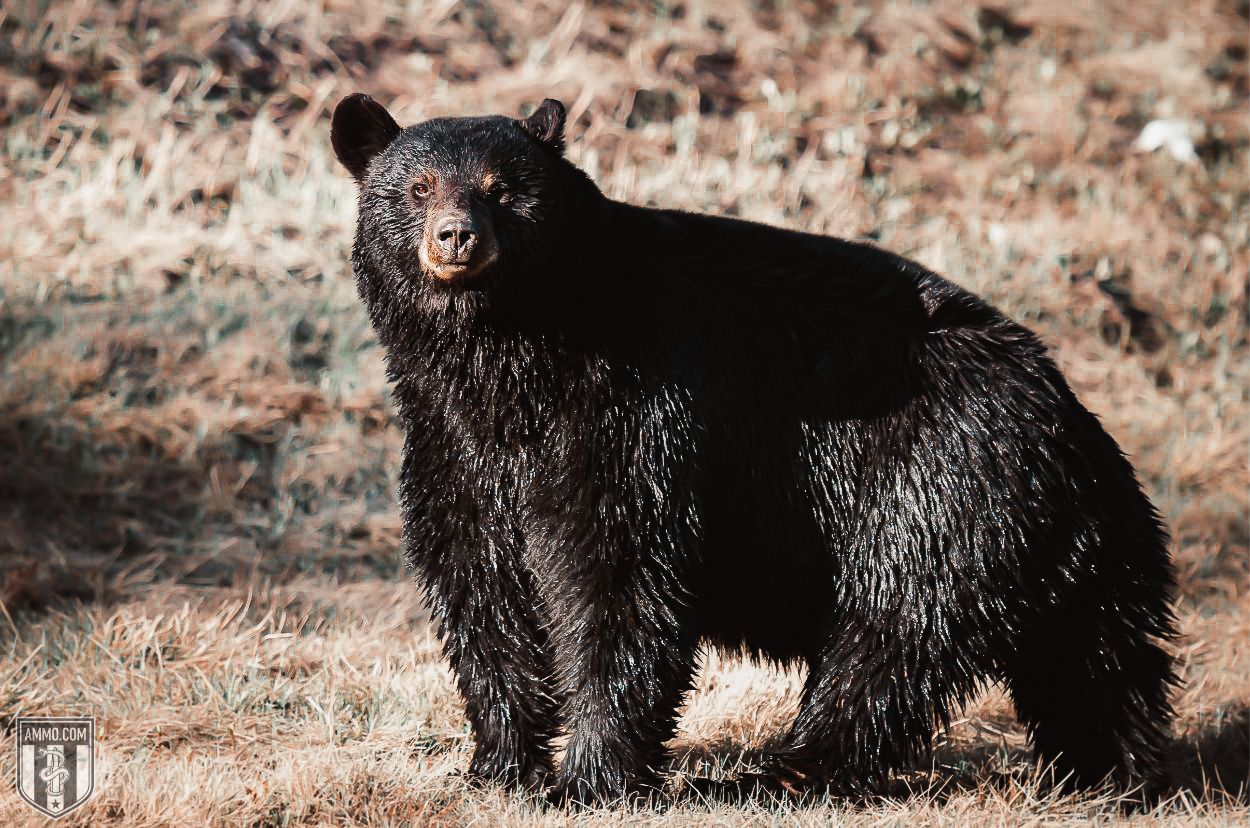
Yep. Next question.
In all seriousness, the heavier grain bullets in the 200gr+ range will generally be preferred for bear defense for the same reasons we discussed above: penetration.
There’s a lot of fur, fat, muscle, and bone protecting a bear’s vitals, and you need a big, solid bullet to get through all that. Other things being equal, a larger projectile transfers more of its total energy to the target and is more likely to remain intact after striking a skull or a rib so it can do its job.
For bear, the minimum that I would personally want would be 180gr, but there is something to be said for a smaller, lighter projectile that’s going faster.
Speed Kills: High-Velocity Ammo for High-Velocity Threats
Of course, the other side of the energy equation is velocity. A higher-velocity round carries more energy overall and allows an expanding bullet to get deeper into soft tissue before the increased drag caused by the round mushrooming open causes it to stop.
With non-expanding projectiles, our preferred bear remedy, more muzzle velocity means that the round has a better chance to go deep enough to hit something vital and helps the round punch through heavy muscle and bone instead of bouncing off or stopping entirely.
And to get a little technical, velocity has more of an effect on impact energy than mass does. Let me explain.
To calculate energy at impact, the formula is (Mass x Velocity2)/2. Don’t worry; you don’t need to do any math, but this means that if you double the mass of your bullet, you get double the impact energy.
On the other hand, if you double the velocity of your bullet, you get quadruple the impact energy. So when in doubt, go with the faster, lighter bullet over the heavier and slower one as long as the lighter one is still in the 180gr+ range.
In general, when thinking about 10mm for bear defense, look for loads that leave the muzzle above 1000 feet per second, and you’ll be alright, with 1200 fps being the preferred benchmark for lighter bullets.
Bulk 10mm Ammo for Training
Of course, this discussion is moot if you aren’t confident in your ability to hit a charging bear somewhere that matters.
Fear, adrenaline, and the fact that you’re probably carrying a large amount of other gear and equipment will degrade your shooting performance when that brown bear you didn’t notice charges out of the undergrowth at you.
It’s crucial to train until you’re more than just proficient with any gun you plan to defend yourself with. The general rule of thumb is that, when your life is on the line, you will default to the lowest level of your training.
That means that your shooting is probably going to be the worst it can possibly be when that bear is coming at you, so you need to be proficient enough that your worst day of shooting is still good enough to stop a half-ton apex predator running at you as fast as a racehorse.
And that, friend, means you need to buy up as much ammo as you can afford and train with it. Often.
Here are our recommendations for affordable 10mm ammo that you can train with, without breaking the bank:
- Blazer Brass 180gr FMJ (50-round box)
- Federal American Eagle 180gr FMJ (1000 round bulk case)
Don’t Dismiss the Bear Spray
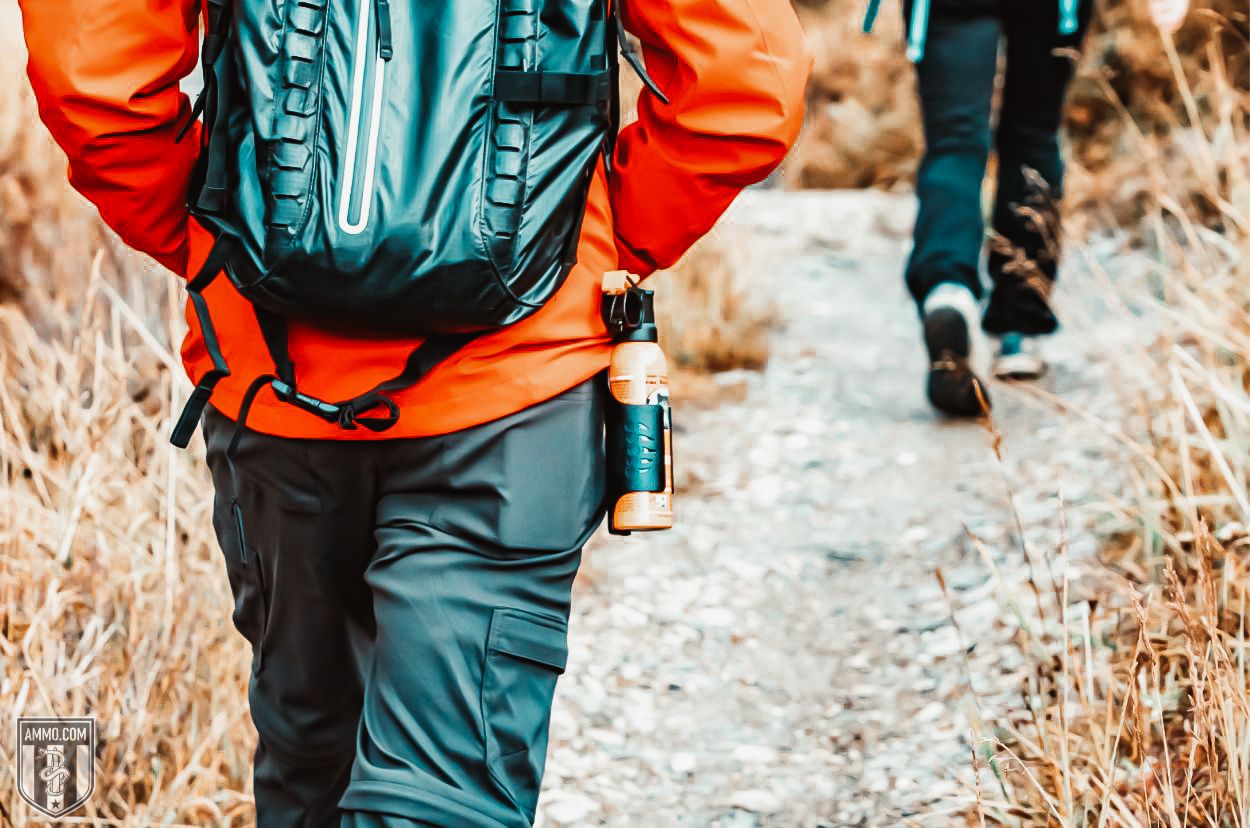
I know what you’re thinking (“Bear spray? Really?”), but hear me out.
We’re here to talk about ammo, but we also have a vested interest in keeping our readers safe, so we have to talk about bear spray vs. a handgun for stopping an angry bear.
The truth is, if you look at the statistics, bear spray is actually a more successful option than a firearm for stopping a charging bear.
Studies in Alaska have shown that in cases where bear spray is deployed to stop “undesirable activity” from a bear, the spray is effective in stopping said activity over 90% of the time. And in 98% of those successful deployments, the person involved remained unharmed.
To quote the study:
“Of the 72 cases where persons sprayed bears to defend themselves, 50 (69%) involved brown bears, 20 (28%) black bears, and 2 (3%) polar bears. Red pepper spray stopped bears’ undesirable behavior 92% of the time when used on brown bears, 90% for black bears, and 100% for polar bears. Of all persons carrying sprays, 98% were uninjured by bears in close-range encounters.”
On the firearm side of things, a similar Alaskan study showed that firearms were only successful in stopping “undesirable activity” 84% of the time for handguns and 72% of the time for rifles.
Now, I’m a gun person, you’re a gun person, and we’re here to talk about ammo, but it sure sounds like the bear spray is the best option, right?
Nope.
The best option by far is to carry both. Having the spray as a non-lethal option is great if, say, you need a bear to get away from your ground blind or the base of your deer stand or as a general first deployment option.
And if you shoot a bear in self-defense, the game warden will have questions for you (and rightfully so).
Spray one? No harm, no foul.
But bear spray can’t really be deployed when a bear is already on top of you, and it’s certainly not going to kill a bear that has made up its mind to follow through with an attack no matter what, such as a sow defending her cubs or a polar bear that’s days from starving.
As much of a pain as the extra weight and bulk on your belt might be, the best solution is to have both the gun and the spray available, or even better, have your hiking/hunting partner carry one, and you carry the other.
Personally, I’d take the gun, but you can have that discussion with your buddy and decide amongst yourselves.
Final Thoughts & More 10mm Resources
10mm is a great round and one of the premier choices for dealing with a dangerous, unexpected bear.
With most 10mm handguns, you have 10-15 rounds in the magazine, and with the correct round, you stand a very good chance of disrupting something vital in the bear’s physiology before it can disrupt something vital in yours.
Now that you know which are the best 10mm ammo rounds, be sure to check out our other 10mm ammo, look more into 10mm vs 9mm for carry, or head back up to our top 10mm rounds for bear protection by clicking here.
